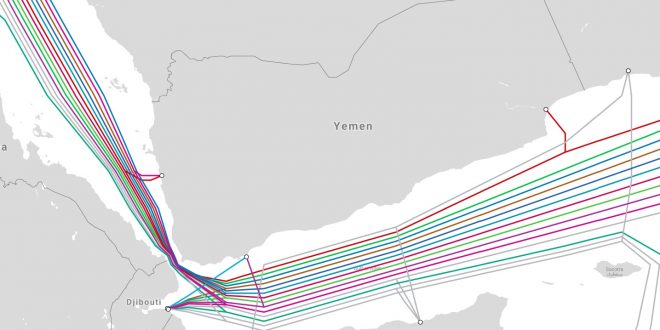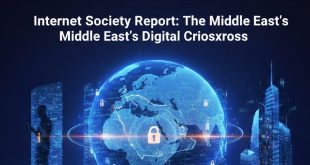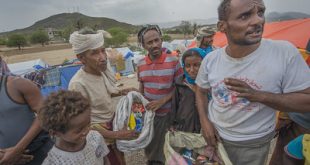By Abdulrahman Abotaleb
“I have lost a lot of my business and customers as a result of prohibiting [the mobile application] Telegram by the authority in Yemen,” Ali Ibrahim said. Ali is a businessman working in the mobile and electronic accessories business. He depends on the Internet as the main platform for promoting and selling his goods. Ali is not the only one who complains as well. Journalists, human rights activists, experts, and other stakeholders also complain about government surveillance, and the filtering of and monopoly over the Internet in Yemen.[1] The Yemeni government is the exclusive provider, controller, and policymaking body overseeing all decisions related to the Internet in the country.
Three years ago, some experts and activists launched a campaign aimed at breaking the Internet monopoly in Yemen[2]. The government, indirectly, claims that a free and open Internet would cause the loss of money because it is used for trafficking international phone calls[3], and it is also used by terrorist groups to promote their radical thoughts and recruit youth.[4] The dispute over how Internet in Yemen should be managed is getting worse day-by-day. This dispute could lead to some sort of clash between the government and other stakeholders unless Yemen adopts a multistakeholder, bottom-up, and inclusive model of Internet governance.
“Internet governance is the development and application of governments, the private sector, and civil society, in their respective roles, of shared principles, norms, rules, decision-making procedures, and programs that shape the evolution and use of the Internet [5],” and, “The multistakeholder governance model, sometimes known as a multistakeholder initiative, is a governance structure that seeks to bring stakeholders together to participate in the dialogue, decision-making, and implementation of solutions to common problems or goals [6].”
To build a successful multistakeholder model of Internet governance in Yemen, we first need to build a bridge between all stakeholders by maximizing common interests and minimizing individual fears of each stakeholder, especially the government. It is vital to convince all stakeholders to come together and meet each other around one table to discuss all possible concerns. Accordingly, a local multistakeholder initiative aiming to design a national strategy on the Internet could be established. Such an initiative should be promoted to the public through collaborative partnerships with the local media in order to raise awareness among the local government, civil society, and other entities about economic, political, technical, and social issues of Internet governance and the multistakeholder governance model.
This initiative would lead to creating a multistakeholder group that can be the responsible entity for drawing up policies related to the Internet in Yemen. It could also become the solid core to build an effective national Internet Governance Forum (IGF) in the country. Actually, members of the Internet Society Yemen Chapter (ISOC-Yemen) have tried to conduct this mission. They established the first brick by devising a multistakeholder model in Yemen two years ago.[7] Unfortunately, however, their efforts and activities have been suspended as a result of the war in Yemen.
Building a successful multistakeholder model of Internet governance in Yemen also needs special training in Internet governance. Although a few Yemeni experts had been well-trained by the Internet Corporation for Assigned Names and Numbers (ICANN), DiploFoundation, Hivos, and other well-known institutions, the idea of Internet governance is still new in Yemen. A multistakeholder model is built into the training activities, facilitating the involvement of government officials, civil society representatives, businesspeople, journalists, academics, and other actors in modern political, national, and international affairs. Under the multistakeholder model, participants are exposed to various professional cultures, approaches, and views on important policy issues. This enriches their experiences and facilitates future communication between the various stakeholders [8].
There are many benefits of adopting such a model for Internet governance in Yemen. For example, it could open the competitive door for investors to invest in the Internet sector. This could lead to the creation of more robust Internet infrastructure, paving the way for the establishment of Internet exchange points (IXPs) in Yemen. Such infrastructure will provide a better opportunity for people to easily access the Internet and get higher quality of service (QoS) for lower and more affordable prices [9]. Furthermore, the multistakeholder model has the ability to strike a balance between freedom of expression, human rights, and national security requirements [9]. Internet governance in Yemen would also manage to ensure an appropriate environment for fostering the digital economy and digital entrepreneurship – so much so that it is expected that Internet governance will eventually play a positive role in the long-term sustainable development of Yemen [10].
On the other hand, there are many challenges facing the process of building multistakeholder collaboration in Yemen. The biggest is the instability in all aspects of public life in the country. For example, ISOC-Yemen managed to bring ICANN and RIPE NCC (the regional Internet registry for the Middle East) to Yemen in late 2014 [11]. They organized workshops to explain more about Internet governance. They also arranged meetings and activities between ICANN, RIPE NCC, the Ministry of Information Technology and Telecommunications, telecommunications companies (Yemen Mobile, SabaFon, and MTN), Internet service providers (ISPs) (YemenNET and Teleyemen, both which belong to the government), and some academic institutions such as University of Science and Technology, Sana’a (UST) and Lebanese International University (LIU). ISOC-Yemen has many dreams and plans to improve the Internet in Yemen, but as I mentioned, most of their plans and activities have been suspended because of the war in Yemen.
Given that the multistakeholder Internet governance model was originally developed at the international level, devolving to the regional level and finally the national level, external events were and continue to be the key to triggering local interest in multistakeholder initiatives, especially from the government [12]. Therefore, since Yemen has not properly engaged in all Internet governance events all those years, neither internationally nor regionally, we need to start building the whole idea of Internet governance from scratch, and that means overcoming more difficulties.
In addition, both state and non-state actors in Yemen, as is the case in many countries in the Middle East and North Africa, believe that the Internet governance dialogue is just a waste of time. They have been less willing to engage with global communities, and the multistakeholder model has sometimes been an obstacle [13]. For example, when I participated in the latest Arab IGF, which was held in Beirut, Lebanon, in 2015, I noticed there was no delegation representing either the Yemeni government or the Yemeni private sector.
In general, the weak representation of Arab governments was clearly noticed at the time [14]. For Yemen to be adequately represented in the Internet governance ecosystem, it is important that organizations with authority in the country, and those with the capacity to disseminate the latest information, participate in as many relevant global events as possible [15].
In conclusion, we have to admit that there is a lot to do with regard to building successful multistakeholder Internet governance collaboration in Yemen. The main required step is bridging the mistrust gap between stakeholders. A multistakeholder model will provide the best practice to balance concerns and benefits of Internet governance issues in Yemen. Of course there are challenges, but considering the expected benefits of Internet governance, all challenges could be overcome by successful collaboration between stakeholders.
References and further readings
[1] Sara and Ezabil, “اليمن: حرية التعبير في حال الخطر,” ARTICLE 19, London, 1-902598-99-7, 2008.
[2]“حملة لكسر احتكار الإنترنت في اليمن,” http://www.aljazeera.net/news/scienceandtechnology/2013/1/28/حملة-لكسر-احتكار- الإنترنت-في-اليمن 28-Jan-2013
[3] “80 مليون دولار خسائر الدولة جراء عمليات تهريب المكالمات الدولية!!” [Online]. Available: http://sawtshouraonline.com/index.php?option=com_k2&view=item&id=11557:80-الدولية&Itemid=39&tmpl=component&print=1.
[4] Wright and Marie, “Technology & terrorism: how the Internet facilitates radicalization.,” The Forensic Examiner, vol. 17, no. 4, 22-Dec-2008.
[5]“Tunis Agenda for the Information Society,” presented at the World Summit on the Information Society (WSIS), Tunis, 2005.
[6] “Multistakeholder governance model – Wikipedia, the free encyclopedia.” [Online]. Available: https://en.wikipedia.org/wiki/Multistakeholder_governance_model.
[7]“ملتقى تعريفي بحوكمة الإنترنت في اليمن|.” [Online]. Available: http://www.ar.smex.org/ملتقى-للتعريف-بحوكمة-الإنترنت-في-اليم/.
[8] W. Kleinwächter, The Power of Ideas: Internet Governance in a Global Multistakeholder Environment. Berlin: Marketing für Deutschland GmbH, 2007.
[9] J. Kurbalija, An introduction to internet governance, 6th Edition. Msida, Malta: Diplo Foundation, 2014. ICANN.” [Online]. Available: https://www.icann.org/news/blog/-bc6d756f-7ff5-4f88-8314-8ed219f72456
[12] C. Lerman, “Multistakeholderism and Internet governance: A gateway to open democracy in Latin America?,” Universidad Torcuato Di Tella Law School, Argentina.
[13] Fatani, “Governance of the Internet: policy challenges, stakeholder interests and the importance of the state,” Ph.D. thesis, University of Exeter, 2012. http://accronline.com/article_detail.aspx?id=24340.
[15] Hivos, “Module one: Internet governance history,” in iGmena-DiploFoundation course.
SOURCE: https://www.igmena.org/Meaningful-Internet-Governance-Stakholders-inclusion-in-Yemen
 الشبكة اليمنية للعلوم والبيئة (يمن ساينس) موقع يهتم بأخبار العلوم والتكنولوجيا والصحة والبيئة والسكان
الشبكة اليمنية للعلوم والبيئة (يمن ساينس) موقع يهتم بأخبار العلوم والتكنولوجيا والصحة والبيئة والسكان





